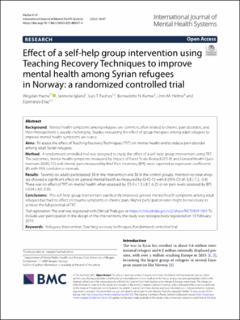Effect of a self-help group intervention using Teaching Recovery Techniques to improve mental health among Syrian refugees in Norway: a randomized controlled trial
Hasha, Wegdan Hamed Nasser; Igland, Jannicke; Fadnes, Lars T.; Kumar, Bernadette. N; Heltne, Unni Marie; Diaz Perez, Esperanza
Journal article, Peer reviewed
Published version

Åpne
Permanent lenke
https://hdl.handle.net/11250/3025124Utgivelsesdato
2022Metadata
Vis full innførselSamlinger
Originalversjon
International Journal of Mental Health Systems. 2022, 16, 47. 10.1186/s13033-022-00557-4Sammendrag
Background
Mental health symptoms among refugees are common, often related to chronic pain disorders, and their management is usually challenging. Studies evaluating the effect of group therapies among adult refugees to improve mental health symptoms are scarce.
Aims
To assess the effect of Teaching Recovery Techniques (TRT) on mental health and to reduce pain disorder among adult Syrian refugees.
Method
A randomized controlled trial was designed to study the effect of a self-help group intervention using TRT. The outcomes, mental health symptoms measured by Impact of Event Scale-Revised (IES-R) and General Health Questionnaire (GHQ-12) and chronic pain measured by Brief Pain Inventory (BPI), were reported as regression coefficients (B) with 95% confidence intervals.
Results
Seventy-six adults participated: 38 in the intervention and 38 in the control groups. Intention-to-treat analyses showed a significant effect on general mental health as measured by GHQ-12 with B (95% CI) of -3.8 (-7.2, -0.4). There was no effect of TRT on mental health when assessed by IES-R (-1.3 (-8.7, 6.2)) or on pain levels assessed by BPI (-0.04 (-4.0, 3.9)).
Conclusions
This self-help group intervention significantly improved general mental health symptoms among adult refugees but had no effect on trauma symptoms or chronic pain. Higher participation rates might be necessary to achieve the full potential of TRT.
